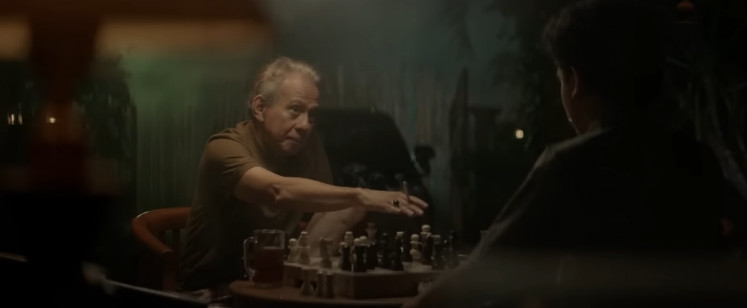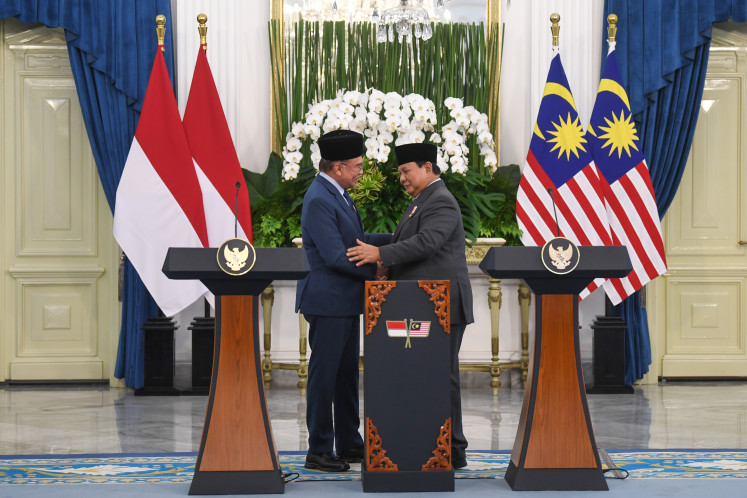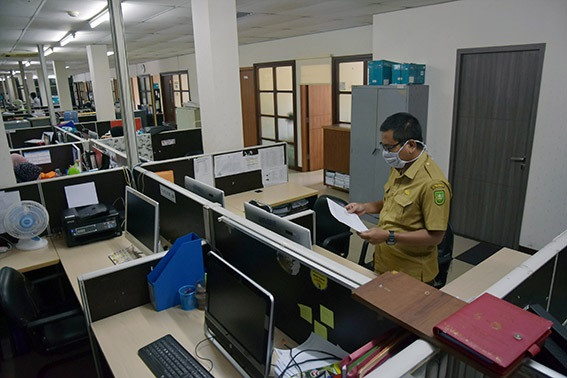Popular Reads
Top Results
Can't find what you're looking for?
View all search resultsPopular Reads
Top Results
Can't find what you're looking for?
View all search resultsIn ‘Autobiography’, the New Order pattern of power abuse never left
Decades after Soeharto’s regime, Makbul Mubarak’s award-winning thriller ‘Autobiography’ leaves audiences wondering whether Indonesia’s power structure remains unchecked.
Change text size
Gift Premium Articles
to Anyone

D
ecades after Soeharto’s regime, Makbul Mubarak’s award-winning thriller Autobiography leaves audiences wondering whether Indonesia’s power structure remains unchecked.
Halfway through Autobiography, retired general Purna speaks to his housekeeper Rakib in a hushed tone in the dead of dawn: “Make sure what we’re doing is safe.”
During a special screening on Jan. 17, the audience did not know what the characters were about to do, but they held their breath. Purna’s intimidating air had already prepared them for the worst.
Autobiography is directed and written by newcomer Makbul Mubarak, who up until the film’s creation was an established film writer, critic and lecturer. With only a few short films under his belt, Makbul’s feature debut turned out to be an incisively political and frightening film about a former military leader running to be mayor in a small town in East Java.
Indonesia’s bloody history of human rights violations, something that President Joko “Jokowi” Widodo has only recently apologized for, is enough of a background to paint a picture of how dangerous the general’s power can be, even in retirement.
“Some [of the] audience in the previous special screening said, ‘How brave of you to make a movie about this issue,’ but I made this movie because I’m scared,” he answered to The Jakarta Post in a press conference after the screening. “The movie comes from fear.”

And audiences around the world felt that fear. Autobiography took home various best film prizes at festivals in many countries, from Adelaide Film Festival in Australia to the big Venice Film Festival in Italy. Hot on the heels of that winning run, it won best original screenplay at the 2022 Indonesian Film Festival (FFI) even before hitting local theaters.
“Usually, foreign films come into our local theaters, but now we wanted to bring Indonesian films to the international stage and then bring them back to Indonesia,” producer Yulia Evina Bhara said to the press.
Violence in silence
Despite its thriller genre, Autobiography is promoted as a “horror with no ghosts”, and those who have watched the film might see why. Unrelenting in its execution, every scene is tense, even when barely anything is happening.
“I think silence is deafening,” Makbul elaborated to the Post in a personal interview after the film. “And there should be tension in silence, so I was always looking for tension.”
Where others might be tempted to put in haunting scores, Makbul leaves a lot of silence in the sound design, filling the entire studio with a lingering dread.
“Even if the film is very calm and doesn’t have a lot of sounds, you feel tension. So it’s not a silence built out of a void, but out of intensity,” he said.
The horror also greatly emanates from former general Purna, whose intimidating presence looms over Rakib, a son of his now-incarcerated housekeeper. Rakib takes care of Purna almost as his estranged father, and, in a twisted way, Purna’s love for him leaves Rakib both safe and trapped under his power.
“I tried to avoid template acting,” senior actor Arswendy Bening Swara told the Post about his preparation to play Purna. “I took inspiration for this figure from several past generals. Like a designer, in a way. I took this general here, there, how this one thinks, how another one speaks, how that one looks at people, and I tried to compile them into one figure.”
But most importantly, he tried to keep an intimidating sense, scene by scene, from the beginning to the end.
“The word Makbul said the most to me was ‘intimidation,’” Arswendy shared. And he took it to heart to the point that actor Kevin Ardilova, who plays Rakib, said he was genuinely scared of him on set. Both of them won the best actors' prizes in national publications like Tempo, while Arswendy also took home best actor at last year’s Marrakech International Film Festival.
Cyclical, institutional power abuse
Famed theater figure Yudi Ahmad Tajudin, when first offered a role in Autobiography, asked Makbul what the film was about.
“His answer left such an impression on me,” Yudi told the Post. Makbul’s answer, he said, was that the film was about “post-militarism.”
“It’s how a military-centric era like the New Order seems to have ended, but there is still a power structure that continues even in everyday life,” Yudi shared.
The 30-year-long New Order era left a bath of blood in its trail from the ‘60s communist massacre to the ‘90s students’ disappearance under the Soeharto regime. Makbul, born in this era, admitted that his personal experiences and fears during his childhood inspired the film. But Autobiography is set in 2017, long after the former president’s period of militarized dictatorship.

“The reason it was set in 2017 is the root of the question. This should’ve ended long ago, but why do I still feel some residue of it now?” he said to the Post.
Asked whether that fear had grown in recent years, Makbul answered that it felt cyclical instead – an unending circle of coming-and-going terror.
“That’s why the film’s ending seems more like an open question: Who will Rakib be?” he said. “I don’t know how this cycle of fear will end, or if it will at all. But at least I’m sharing that question first and foremost in this film.”
Its stunning picture aside (thanks to Polish cinematographer Wojciech Staroń), the film’s most vital aspect lies in the script and characterizations. Each character seems to be individually faced with power; some abuse it, some rise up to it, some challenge it (with grave consequences) and some steer clear of it.
Actor Lukman Sardi, for example, plays Soewito, a lower-rank general brought up under Purna’s wings. His position and experience with Purna earn him a spot where he might witness the retired general’s atrocities but does not have to speak up about them.
“He might know some stuff, but he’s the typical officer that just lets it go and does his duties as usual,” Lukman explained.
“It’s an interesting exploration because this character can do something in the lanes of the law, but he chooses to remain silent and be in the middle. If we look around us, real people are like that.”
This part of the script was what sold Yudi from the get-go, something that he described to the Post as having a “very strong” structure.
“The foreground is a personal relationship between two people, an older and a younger generation. But if audiences want to dig deeper, they’ll find a lot of layers and undertones to it,” he gushed, peeling back the story to reveal relationships between a master and a servant, a father and a son and so on.
International praise
Autobiography has won 13 prizes in countries where people might need to become aware of Indonesian history.
“Knowing that we received the prize from Australian audiences, for example, [shows] there are several gates and doors to enter this film, and I don't mind if the international audiences do not grasp the political aspects of it,” Makbul told the Post. “Even if you take them all out, it’s still a thriller.”
But due to the film’s astute writing, the terror of power abuse shows that fear, no matter the region, is universal.
“We know Donald Trump is a figure like [General Purna], so is Putin. It's about this latent dictatorship that’s always waiting for the right time for them to take over, [...] and Indonesia, every election is always on that verge. There’s this fear that this kind of leadership will come back,” he explained.
The film is also a product of international collaboration. Makbul and Yulia developed the film in 2017 in Turin-based TorinoFilmLab, taking feedback from screenwriters from other countries. Seven countries decided to finance the movie after two years and several film labs later.
Asked whether the subject matter was still relevant in today’s Indonesia, Arswendy, who has lived through the country’s tumultuous times, nodded vigorously.
“Very much so, and it’s still prevalent because power lies everywhere. It’s in the RT [neighborhood unit], or RW [community unit], depending on the agencies. We’re still seeing violence in campuses and households,” he said.









